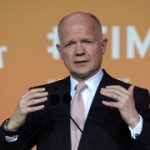Words, words, words. At the Global Summit to End Sexual Violence in Conflict, I spent most of the day listening to words and phrases used by human rights activists to describe sexual violence in conflict – words that are being co-opted by government officials. Activists were the ones who recognized the courage and resilience of survivors. Survivors made the connections between peace and justice. Advocates promoted justice that focused on restoring dignity to victims through meaningful reparations as well as justice that focused on holding the perpetrators to account.
Today, the language of activism, survival, and justice has been smoothly co-opted by government officials who spoke – sometimes movingly – about their commitment to stopping sexual violence in conflict. Unfortunately, their actions so rarely match their words.
As I described my frustration to another participant, she asked me why I found it so troubling. She pointed out that – with time – words can and do lead to action. As I examined my frustration, I realized that I often feel that promises are made, but not truly owned.
The day at the summit was filled with ministerial dialogues. I witnessed lots of ministers, but in the dialogues I attended, there was no actual dialogue. Government officials had carefully prepared speeches filled with words that they didn’t seem to always understand. Even when time was running short and moderators implored the presenters to shorten their remarks, they stuck to the script.
Would it have been so difficult for at least one of them to say, “Let’s stop with the words – it is time to show what our convictions are made of”? Not one of them did.
The morning began with greater promise. At the opening plenary, UK Foreign Secretary William Hague used the language of activists and survivors in a compelling speech. But what differentiated his speech was that he included concrete actions that he and the UK government are taking with regard to committing additional resources to end sexual violence in conflict. There was no jarring disconnect between his words and his actions.
There was another very bright moment that stood in contrast to the speeches by government officials; the words of Leymah Gbowee – a Nobel Laureate from Liberia – were moving, but her actions are even more powerful.
Gbowee, with virtually no resources, organized women in Liberia to demand an end to the country’s civil war. Under her leadership, thousands of women – both Christian and Muslim – mobilized against the war. Their efforts forced Charles Taylor, then president of Liberia, to meet with them and agree to enter into peace negotiations to end the 14-year civil war, which was marked by systematic attacks on civilians, including widespread rape.
But Gbowee was not content with just getting Tayler to the talks; she wanted the talks to conclude with a peace agreement. So when the talks stalled, she and nearly 200 women took over the corridors around the hall where the negotiations were ongoing and refused to leave until an agreement was signed.
The rest is history. Charles Taylor stepped down, went into exile, and was eventually tried and found guilty for aiding and abetting war crimes by the Special Court for Sierra Leone. Ellen Sirleaf Johnson was elected president, becoming the first female head of state in Africa. And in 2011, Gbowee and Johnson were co-winners of the Nobel Peace Prize for their nonviolent efforts in promoting the safety of women and women’s role as peacemakers.
If one determined woman with few resources can literally change the course of history, why do we see so many politicians hiding behind words? A half day of the summit remains. The crucial question remains, will the governments attending the conference get the message that it is #TimeToAct?

